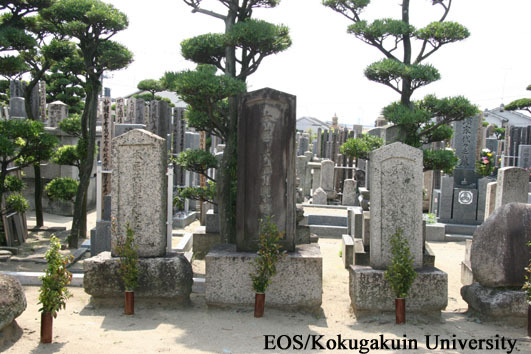- トップ
- Encyclopedia of Shinto
- Motoori Ōhira
Encyclopedia of Shinto
| Main Menu: | |
| Links: |
詳細表示 (Complete Article)
| カテゴリー1: | 8. Schools, Groups, and Personalities |
|---|---|
| カテゴリー2: | Personalities |
| Title | Motoori Ōhira |
| Text | (1756-1833) Scholar of National Learning (kokugaku) of the early modern period. His original lineage name was Inagake and his formal name was Shigeho, but he later took the name Ōhira. He was called Sōshiemon after he was adopted into the Motoori house, and his epistolary name was Fujinokakitsu. Born in 1756 in the town of Matsusaka in Ise Province, now Matsusaka City, Mie Prefecture, to Inagake Munetaka, a disciple of Motoori Norinaga and proprietor of a tōfu (bean curd) business called Tamaruya. Ōhira became a disciple of Norinaga at the age of thirteen, and thereafter studied closely with his mentor. He inherited the Inagake family business after his father's retirement, but then became a dependent of the Motoori household when Norinaga's eldest son Motoori Haruniwa went blind in 1799 (Ōhira was forty-four years old at the time). His biological father died the following year, Norinaga died in 1801, and one year later Ōhira was officially adopted to carry on the Motoori family name. He was then called upon to serve the Kishū Wakayama domain in the place of Haruniwa. He moved to Wakayama in 1809, and thereafter played a crucial role in integrating Motoori's tradition of scholarship, giving lectures in various local Suzunoya academies, and together with Motoori Haruniwa's "Latter Suzunoya Academy" (Nochi-Suzunoya) in Matsusaka, actively working to educate the next generation of Suzunoya scholars. Motoori Ōhira was also greatly trusted by the Kishū domainal authorities, for whom he served as an instructor of ancient texts and oversaw compilation of the Continuing Gazeteer of Kii Province (Kishū zoku fudoki), in that way contributing to the rising status of kokugaku scholars. It is said that Ōhira was warm-hearted and honest by nature, and his scholarship takes a moderate stance. He was particularly skilled at composing poetry in both ancient and modern styles, and he enjoyed travelogues (kikōbun); he was not particularly creative, however, and he is generally evaluated as an apostle of Norinaga's scholarship. Yet his abilities must be highly evaluated for supervising the Suzunoya Academy in the period following Norinaga's death, as it expanded, diversified, and experienced intellectual ferment, raising kokugaku's social status as a result. Ōhira suffered the loss of his sons one after another, and as a result reached a crisis in designating an heir. He finally adopted Hamada Takakuni of Owari (Nagoya) as husband for his third daughter Fujiko, and made him heir to the Wakayama Motoori lineage with the name Uchitō. Ōhira died in Wakayama in 1833 at the age of seventy-eight. He was posthumously conferred the Buddhist ordination name Washin'in Ifuhitsuraku Koji and the posthumous name Kunitaruyasokotodama no ushi. His written works include Fujinokakitsu mondōroku (Chronicle of Questions and Answers by Fujinokakitsu), Inabashū (Inaba Collection), Yasoura no tama (Jewel of Yasoura), Yamatogokoro sanbyakushu (Three Hundred Verses on the Yamato Mind), Fujinokakitsushū (Collected Works of Fujinokakitsu), Kusamakura no nikki (Pillow Book Diary), Okagemōde no nikki (Diary of an Okagemairi Pilgrimage), Arima nikki (Diary of Arima), and Kibi kikō (Travel in the Year of the Ram). The Department of Letters at the University of Tokyo serves as the repository of the Motoori Family Wakayama book collection. - Mori Mizue |




